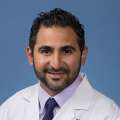Reproductive Health and Fertility
Find your care
UCLA Health is a safe and supportive environment for transgender and gender-diverse patients. Call 310-267-4334 to make an appointment.
Family Building
There are unique considerations for transgender and gender-diverse individuals regarding their fertility. Your team at UCLA Health Fertility and Reproductive Health will tailor your fertility treatment to your specific goals and needs. Available treatment options include: ovulation induction, intrauterine insemination, and in vitro fertilization. Patients may use donor eggs, donor sperm, or a gestational carrier during their fertility treatment.
Fertility Preservation
Transgender and gender-diverse individuals should be counseled regarding the effects of gender-affirming therapy on fertility and reproduction prior to transition. Both administration of exogenous hormones and surgical management, including removal of reproductive organs such as the testes, ovaries, or uterus can affect fertility.
For example, gender-affirming testosterone therapy is used to induce the development of male physical characteristics (virilization) and suppress feminizing characteristics. Gender-affirming estrogen therapy is used to help feminize patients. Administration of exogenous hormones often suppress both ovulation and sperm development which can often, although not always, resume after discontinuation of hormonal treatment. Surgical treatments that remove the ovaries or testes result in permanent loss of fertility.
Currently, we offer a number of fertility preservation options, including egg, sperm, and embryo cryopreservation. Frozen eggs, sperm, and embryos can be thawed in the future and used for fertility treatments.
Care Coordination: At the UCLA Gender Health Program, we understand the unique challenges that gender expansive patients face when accessing health care. That's why our dedicated Care Coordination Team serves as your first point of contact. We offer a variety of services to support you. For more information >






